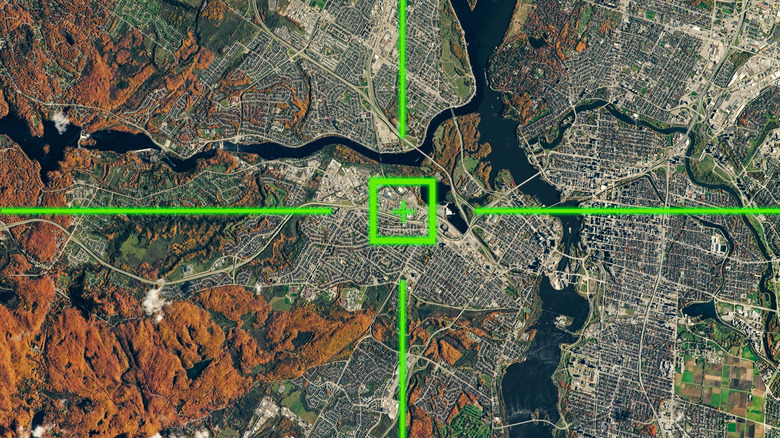Researchers Find New Use For Starlink But Elon Musk May Not Be Pleased
Elon Musk's Starlink is an incredibly ambitious project; it aims to bring high-speed internet to every corner of the globe through its web of satellites operating in low-Earth orbit. This is good news for people in rural areas or developing countries, where installing the infrastructure high-speed fiber internet requires may be cost-prohibitive. As recently as 2017, over 20 million Americans lacked access to high-speed internet — which is around 30% of the country's rural population (via Inc). Those users either had to make do with an incredibly slow dial-up connection or just go without.
In addition to giving rural Americans and other underserved people around the globe access to modern internet speeds, Starlink is also useful in other situations. Earlier this year, the company introduced Starlink RV, a portable terminal that could be used while traveling. Although it could not initially be used while a customer was actually in transit, it received FCC approval shortly afterward and can now function while in a moving vehicle. The company has since launched another additional service aimed at yacht and boat owners who want internet on the go. Starlink has also announced you will soon be able to get the service on planes, though the cost of fitting it to your private jet and then maintaining a subscription may even make a millionaire wince a little.
While that is all incredibly useful, researchers have discovered another area where Starlink could come in handy — however, they've had to go it alone. While SpaceX, which manages Starlink's satellites, was initially happy to entertain the idea, the company's boss was quick to put an end to its cooperation with the effort.
The Starlink system has an unintended use
Starlink's satellite network can actually be used as a GPS system. The idea was first put to SpaceX a few years ago, and the board was apparently willing to entertain the idea. However, according to MIT Technology Review, Elon Musk himself wasn't. The world's richest man quickly shut the idea down, reportedly citing the number of "low-earth orbit communications systems" that have gone bankrupt and demanding Starlink avoids "distractions." Despite Musk's refusal, researchers decided to forge ahead with the project anyway. After reverse-engineering the satellite network's communication systems, the University of Texas at Austin's Todd Humphreys believes he has found a way to turn Starlink into a satellite navigation system.
The system designed by Humphrey's team doesn't hack into or hijack the satellites in any way but does use publicly available information to work out where a specialized receiver is at regular intervals. Details of each satellite's movements are continuously published by SpaceX in an attempt to avoid low-orbit collisions, so that can be accessed. Then comes the issue of working out how the receiver can connect with the satellites. The receiver picks up on a repeating "synchronization sequence" signal each satellite sends out at a regular interval and uses it to work out its position relative to the satellites it can detect. The whole system is accurate to within 30 meters (32.8 yards) or around a third of the size of a football field. For the system to be as accurate as GPS and narrow down the locations of receivers to within a meter, SpaceX would have to jump on board and provide some additional data.
Why a Starlink GPS could be important
As the Aerospace Association explains, GPS wasn't invented by well-meaning people who wanted to make driving to places you haven't been before a bit easier. It was actually designed and put together by the U.S. military, as knowing where something is to a high degree of accuracy is really useful during a conflict. While the general public may now be getting its benefits, the U.S. Department of Defense still has a huge stake in the technology and its applications.
GPS is as useful in a war fought today as it was in the late '50s when the concept was dreamed up, which is why Russia is constantly attempting to jam the system in Ukraine (via Space.com). The satellites that GPS uses are still the property of the United States government, so the Russians are unlikely to do much beyond local jamming, as that would immediately escalate the conflict. However, jamming satellite signals is difficult and unreliable, so if the United States were to engage another global power directly, there's a good chance that satellites like the ones that keep the GPS system going would be targeted early on. This line of thinking is why the Space Force became the newest branch of the U.S. Military in 2019.
So where does Starlink come into all of this? Firstly, the system has proven to be incredibly resistant to jamming during the Ukraine conflict. And secondly, should anything happen to the U.S. government's satellite systems, the very extensive Starlink network would serve as an ideal backup to keep communications and services like GPS going. That's part of the reason the U.S. government funded the University of Texas study.
Starlink has already proven itself uniquely useful
Elon Musk's concerns over the profitability of Starlink aren't just limited to GPS applications. What initially began as a goodwill gesture became a source of international criticism for the billionaire after he mooted withdrawing Ukraine's Starlink service, citing the costs involved. Musk initially shipped receivers to the war-torn country shortly after Russia invaded in February. The move received praise, and it was backed to some extent by the coalition of nations supporting Ukraine's war effort. The U.S. government paid for a large number of the receivers and has been paying around 30% of the costs required to keep the service going.
With a lot of the country's infrastructure, including its cable-based internet service, destroyed by Russian actions, Starlink has proved invaluable to the Ukrainian war effort. Communication is an essential part of modern warfare, and short of destroying all 20,000 terminals or blocking out satellite signals, Starlink can't really be stopped. All Ukrainians really need to keep their communications going is a terminal and a power source.
However, Musk threatened to withdraw the service shortly after a "peace plan" he tweeted caused a major backlash. The billionaire claimed each Starlink terminal in Ukraine cost around a hundred times more to operate than a standard terminal. The costs were ramped up due to constant cyberattacks from Russia, and the demands placed on communications systems during an active conflict. Eventually, Musk performed another U-turn and the Starlink service currently remains active in Ukraine.



